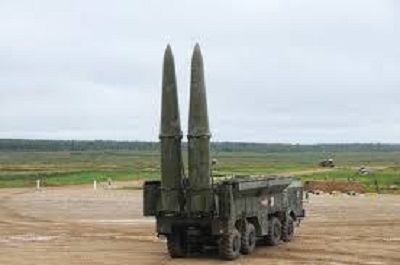Context-
The ongoing conflict between Russia and Ukraine, now in its second year, shows no signs of abating. A recent and alarming development occurred earlier this month when Russia announced plans to conduct drills simulating the use of tactical nuclear weapons near the Ukrainian border. This follows Russia's March declaration to station nuclear weapons in Belarus, intensifying global concerns over Russia's nuclear posturing amidst the conflict.
A Shift in Understanding
- Russia justifies these actions by referencing provocative statements from leaders of countries supporting Ukraine. Specifically, French President Emmanuel Macron hinted at deploying troops to Ukraine, and British Foreign Secretary David Cameron suggested that Ukraine could use British long-range weapons to target Russia. These declarations, according to Russia, necessitate an increased nuclear readiness.
- However, these justifications seem more like acts of brinkmanship and coercion rather than responses to existential threats. Macron and Cameron’s comments do not pose genuine survival threats to Russia that would warrant such an escalation. The actions taken by France and the U.K. are not direct threats to Russia’s existence, making Moscow's nuclear readiness claims appear exaggerated.
- At first glance, Russia's nuclear threats might seem like predictable deterrence tactics aimed at preventing further intervention by Ukraine and its allies. Similar tactics have been employed by nuclear-armed states like North Korea facing threats from larger adversaries. Yet, the current crisis signals a significant shift in Russia’s nuclear policy, potentially lowering the threshold for nuclear weapon use. If this trend becomes normalized, the consequences could be profound.
The Evolution of Nuclear Deterrence
- For decades following the Cold War, the principle of nuclear deterrence rested on several key understandings. Central among these was the concept of mutually assured destruction (MAD), where any use of nuclear weapons would result in catastrophic damage for all parties involved. Additionally, nuclear weapons were considered a last resort, to be used only in the face of an existential threat.
- In the Russia-Ukraine conflict, the war, though severe, does not pose a direct existential threat to Russia. Nonetheless, Russia has demonstrated a willingness to consider nuclear options. Historically, Russian nuclear doctrine allowed for first use of nuclear weapons only in extreme situations threatening the nation’s survival. The current war, however, has seen Russia stretch and potentially redraw these red lines, indicating a worrying shift in the core principles of nuclear deterrence.
The Dangerous Precedent
- By making explicit nuclear threats in less critical conflict scenarios, Russia is treading a perilous path. If nuclear powers begin to habitually threaten nuclear use as a coercive measure in conventional conflicts, it could embolden other states to adopt similar strategies. This behavior might prompt smaller nuclear-armed nations to believe that brandishing their nuclear arsenal can undermine stronger conventional military adversaries.
- Countries like Iran and North Korea might feel emboldened to cross the nuclear threshold, believing that their nuclear capabilities can force adversaries to back down to avoid escalation. The likelihood of a tactical nuclear strike by Russia remains low at present, but its nuclear signaling sets a dangerous precedent. The distinction between nuclear and conventional warfare is increasingly blurred in this conflict.
Impact on Non-Proliferation and Disarmament Efforts
- Russia’s nuclear posturing also undermines global non-proliferation and disarmament efforts, which are already struggling. The war highlights the vulnerability of non-nuclear states to aggression from nuclear-armed states, potentially motivating other nations to pursue nuclear capabilities for deterrence.
- The Budapest Memorandum, under which Ukraine relinquished its nuclear arsenal in exchange for security assurances from Russia, the U.K., and the U.S., now appears to have been a miscalculation. Recent statements from Iran about revisiting its nuclear doctrine in response to existential threats from Israel illustrate the potential fallout. Although Iran has consistently stated it does not intend to develop nuclear weapons, the prospect of policy shifts in response to perceived threats undermines non-proliferation efforts.
- Such developments might dissuade other nations from pursuing disarmament or relinquishing nuclear capabilities, fearing they could face similar threats of nuclear aggression. North Korea, for example, might become even more reluctant to give up its nuclear arsenal, anticipating potential vulnerabilities.
The Emergence of a New Nuclear Flashpoint
- The dynamics of the Russia-Ukraine conflict have created a new nuclear flashpoint. By lowering the threshold for nuclear weapon use, Russia has altered the traditional understanding of nuclear deterrence. This change highlights how nuclear weapons can provide asymmetric advantages in conventional warfare, increasing proliferation anxieties globally.
- In regions with longstanding tensions, smaller states might now see nuclear weapons as essential for their security. The specter of nuclear war over the battlefield can shift priorities from deterrence to active conflict and from disarmament to proliferation, leading to greater nuclear instability.
Conclusion
Russia's recent actions represent a significant and dangerous shift in nuclear deterrence norms. By lowering the threshold for nuclear weapon use, Russia is setting a precedent that could have far-reaching consequences for global security. This trend undermines decades of non-proliferation efforts and threatens to embolden other nuclear-armed states to adopt similar postures. The clear distinction between nuclear and conventional warfare is being eroded, leading to increased proliferation risks and instability.
The international community must address these changes to prevent further erosion of nuclear norms and to maintain global security. Diplomatic efforts should focus on reaffirming the principles of nuclear deterrence, strengthening non-proliferation treaties, and ensuring that nuclear weapons remain a last resort. The stakes are high, and the potential consequences of failing to address these issues could be catastrophic.
|
Probable questions for UPSC Mains Exam-
|
Source- the Hindu







